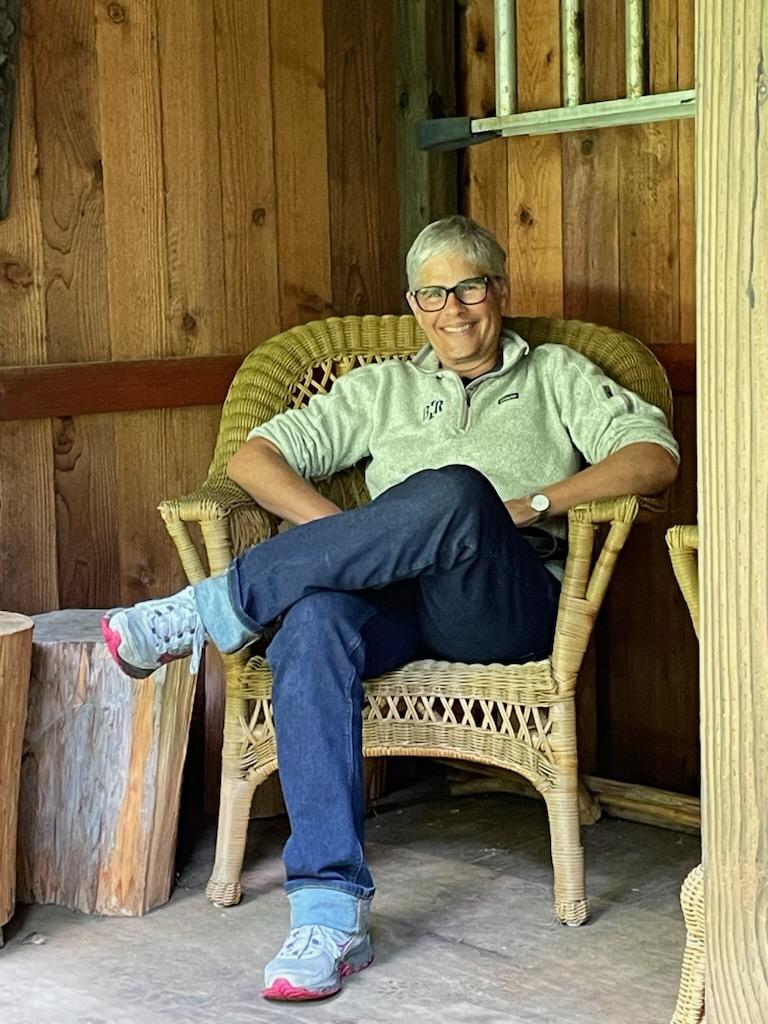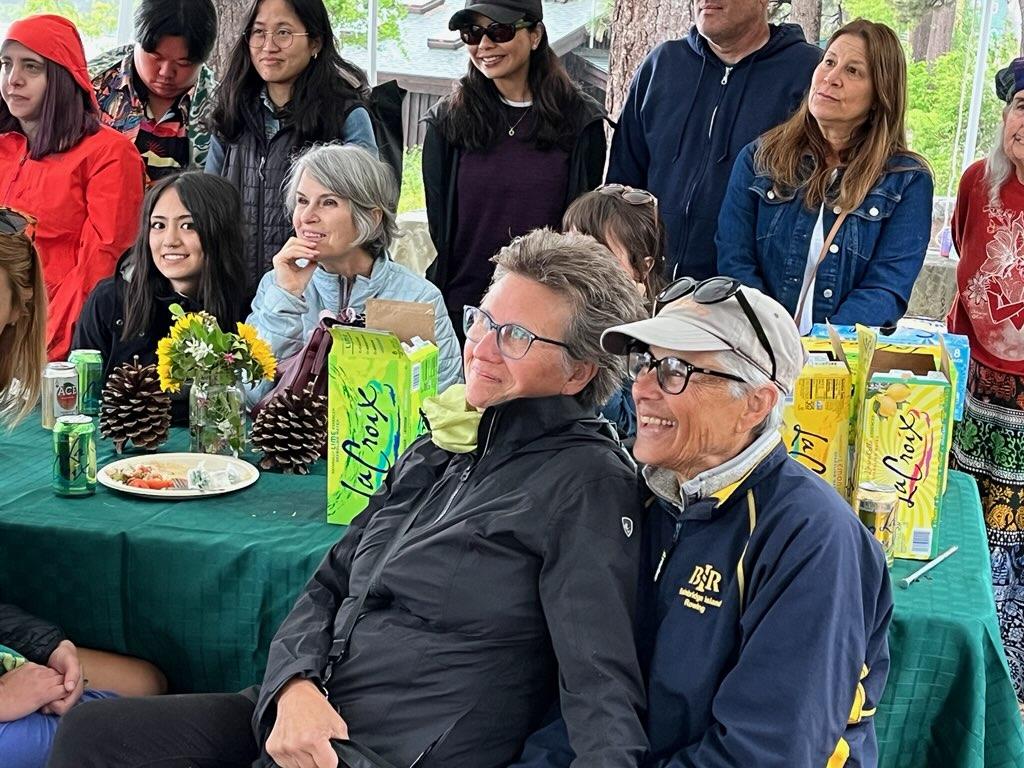Foster ESG Faculty Spotlight – Jill Bamburg
Get to know Jill Bamburg, instructor of Perspectives on ESG in Business, an environmental, social and governance (ESG) elective at the Foster School of Business.
Please tell us a bit about your background.
I am currently retired after three careers: one in small town and environmental journalism, one in marketing in the computer software business, and one in teaching in graduate business programs. I spent the last 15 years of my career at the Bainbridge Graduate Institute (BGI), the first MBA program in the country to focus on sustainability. I was one of the co-founders and a long-time administrator and teacher. I have taught marketing, strategy, entrepreneurship and sustainable business. I also wrote a book called Getting to Scale: Growing Your Business without Selling Out (Berrett-Koehler, 2006) about how to scale mission-driven businesses.

On the personal side, I am a lesbian married for 15 years to the love of my life, a psychotherapist. Between us, we have a blended family of four adult children with our first grandbaby expected in December. My hobbies include rowing, pickleball, golf, gardening, travel and reading. And on the all-important question of cats vs. dogs, it’s DOGS all the way. Our current companion is Velo, a 10-year-old Mexican rescue “schnoodle” (Schnauzer-poodle cross).
What excites you about your subject area and what are some of your research interests?
My interest from the time I wrote my business school admissions essay has been using business as a force for good. The ESG class that I teach is a subset of that interest, which increasingly focuses on climate change and inequality and the need for wholesale systems change to address those issues. ESG represents a more incremental approach – a good beginning, but by no means the answer.
Which factors influenced your decision to join UW Foster?
I have always taught in alternative educational institutions (BGI, Antioch University/Seattle) and I wanted to give myself a shot at teaching in a mainstream institution. The University of Washington is the flagship educational institution in Seattle, so I was honored to be given the opportunity to teach here.
What do you find meaningful about your time thus far at Foster?
What I love most about teaching is interacting personally with students, helping them articulate and pursue their dreams. I am gratified that among students dipping their toe in the water of the ESG class most are committed to the same goal I am: using business as a force for good.
How does your work align with Foster’s purpose? Purpose statement: Together…We Foster Leaders; We Foster Insights; We Foster Progress…To Better Humanity
My mission totally aligns with Foster’s – it’s a question of whether the implementation of that mission goes as far as I think it needs to.
How have you worked to make your classroom/course curriculum inclusive?
This is a work in progress for me. I LOVE the diversity of students in the classroom, particularly international students. The work is to tinker with the course structure to bring those voices alive in the classroom.
How have you supported students outside the classroom?
Mostly I just do coffee, listen, and then try to make connections.
How is your teaching influenced by instructional best practices?
For adult students, there are two major teaching philosophies: “the sage on the stage” and “the guide on the side.” I strongly favor the latter, which I would call “facilitating student learning.” My goal (not always realized) is to curate the best articles I can find, to keep lectures brief and focused on framing, and to build interactive activities that engage students in the classroom.
How do you maximize learning and keep students engaged?
This is a challenge that I am currently working on. We used a debate format for selected issues this year and that worked pretty well. I am going to experiment with a “warm call” approach to classroom participation this coming year. I’m also working on asking more targeted questions that will elicit stronger class participation.
Are you currently doing work outside of Foster that influences what happens in the classroom?
Most of the work I currently do outside of Foster is in the area of values-aligned, or impact, investing. Much of my outside reading is in the area of political economy and systems change. All influence my teaching.
How have your relationships with industry experts influenced what happens in your class?
I have some amazing contacts in the business world and I make extensive use of guest speakers who bring the challenges of doing ESG in the real world into the classroom.. As appropriate, I also introduce students to possible employment opportunities.
How has your research influenced the curriculum at other business schools?
Not as much as I would have liked. We built an original curriculum incorporating sustainability issues into every course and accompanied by a two-year leadership development program that provided growth and continuity throughout the program. I continue to believe both of these things are critical to building the leaders we need for the future. Unfortunately, most business schools are so committed to their traditional curricula that they feel they “don’t have room” for these other issues. I disagree.
Are there components of your elective that can help students build their resume?
At this point, I offer students a choice for their final project: a case write-up or a paper on a topic of particular interest to them. Most students choose the former; those who have chosen the latter have made their academic work directly relevant to their career goals or next steps.
How will students apply the knowledge and skills they gain in your classroom in their careers?
My hope: Abundantly…all day every day…in every business decision they make. The key question is to ask themselves: how will this business decision impact people and the planet, as well as profit. If the answer comes up negative too often, I hope they will change jobs. There’s too much important work to be done in the world to settle for a business-as-usual answer.
Any tips for incoming MBAs on how they can brush up on skills/knowledge over the summer?
Read Doughnut Economics (Kate Raworth, Chelsea Green Publishing, 2017) before you take your first MBA economics class.
Please tell us briefly about the structure of your elective course – what can students expect to master by the end of it?
The structure will change this year from one 3.5-hour evening class per week to two 2-hour late afternoon classes per week. Hallelujah (except for missing the insights of the Evening MBA students). I am working on revisions based on my first UW teaching experience last year. Stay tuned.
What advice do you have for students to ace your course?
Show up, be present, do the work and – above all – speak up!

